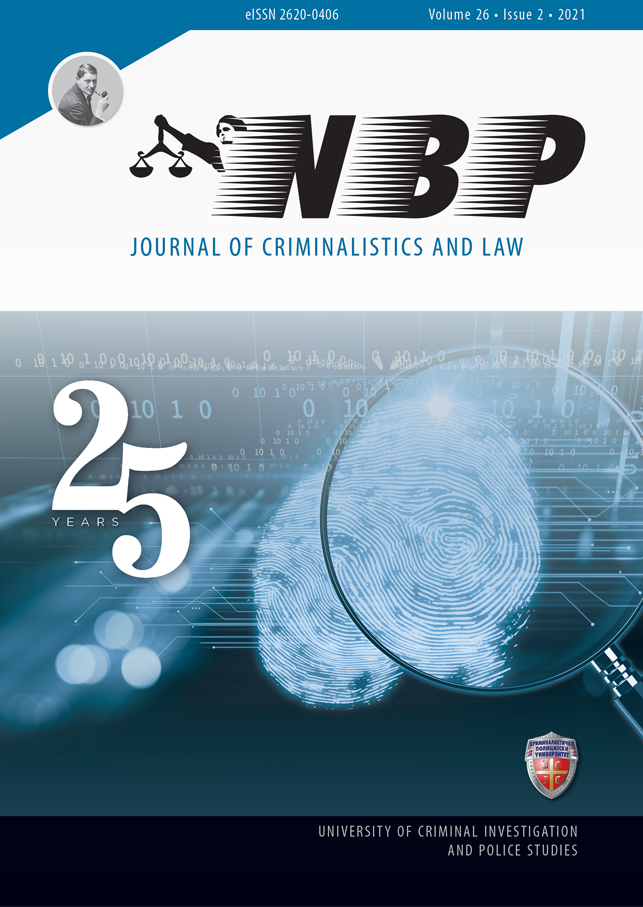Instructor, Trainer, Sifu, Coach or Professor? – Reflections on the Use of Terminology in Police Learning Settings Dealing with Physical Conflict Management
Abstract
Police training and learning settings focusing on physical conflict management skills regularly comprise at least two parties: on the one side individuals learning and developing their conflict management skills and on the other side individuals in charge of planning and delivering the training sessions. While the first category refers to learners the latter category is referred to among others as instructor, trainer, coach, sifu or professor depending on contextual constraints. While it seems arbitrary to use different terms for describing the learner’s counterpart in a learning setting, we argue for a sensible consideration of manifest and latent implications of how these individuals are referred to – and how they perceive their role. Drawing from autoethnographic data in various conflict management training settings we identify functional, dysfunctional and irritating aspects of different used terms. By reflecting through the lenses of functionality from a systemic perspective (Luhmann, 2017), we aim at providing insights towards a more nuanced understanding of contextual constraints and reflexive use of these terms.
References
Basham, B. B. (2014). Police instructor or police educator? Salus Journal, 2(1), 99–109.
Chappell, A. T., & Lanza-Kaduce, L. (2010). Police Academy Socialization: Understanding the Lessons Learned in a Paramilitary-Bureaucratic Organization. Journal of Contemporary Ethnography, 39(2), 187–214. https://doi.org/10.1177/0891241609342230
Heil, V., Staller, M. S., & Körner, S. (2017). Motive in der Selbstverteidigung – Eine qualitative und quantitative Studie am Beispiel Krav Maga und Wing Chun [Motives in self-defense training - A qualitative and quantitative study of krav maga and wing chun]. In S. Körner & L. Istas (Eds.), Martial Arts and Society. Zur gesellschaftlichen Bedeutung von Kampfkunst, Kampfsport und Selbstverteidigung (pp. 146–159). Czwalina.
Kade, J. (2004). Erziehung als pädagogische Kommunikation [Education as pedagogical communication]. In D. Lenzen, Irritationen des Erziehungssystems: Pädagogische Resonanzen auf Niklas Luhmann (pp. 199–232). Surhkamp.
Klukkert, A., Ohlemacher, T., & Feltes, T. (2008). Torn between two targets: German police officers talk about the use of force. Crime, Law and Social Change, 52(2), 181–206. https://doi.org/10.1007/s10611-008-9178-5
Koerner, S., & Staller, M. S. (2020). Coaching self-defense under COVID-19: challenges and solutions in the police and civilian domain. Security Journal, 1–15. https://doi.org/10.1057/s41284-020-00269-9
Koerner, S., & Staller, M. S. (2021). From Data to Knowledge: Training of Police and Military Special Operations Forces in Systemic Perspective. Special Operations Journal, 7(1), 29–42. https://doi.org/10.1080/23296151.2021.1904571
Koerner, S., Staller, M. S., & Judkins, B. N. (2019). The Creation of Wing Tsun – A German Case Study. Martial Arts Studies, 0(7), 5–16. https://doi.org/10.18573/mas.60
Körner, S., & Staller, M. S. (2018). Pedagogy of terrorism. Mujahid Guide revisited. Journal of Policing, Intelligence and Counter Terrorism, 13(2), 332–344. https://doi.org/10.1080/18335330.2018.1503700
Lo, M. K. (2011). Police Kung Fu. Tuttle Publishing.
Luhmann, N. (1990). Die Wissenschaft der Gesellschaft [The science of society]. Suhrkamp.
Luhmann, N. (2017). Gesellschaftstheorie als Wissenschaft [A theory of society as science]. Zeitschrift Für Soziologie, 46(4), 219–248. https://doi.org/10.1515/zfsoz-2017-1013
Milgram, S. (1974). Obedience to Authority: An Experimental View. Harper and Row.
Mitchell, R. J., & Lewis, S. (2017). Intention is not method, belief is not evidence, rank is not proof: ethical policing needs evidence-based decision making. International Journal of Emergency Services, 31(3), 188–199. https://doi.org/10.1108/ijes-04-2017-0018
Morrison, G. B. (2006). Deadly Force Programs Among Larger U.S. Police Departments. Police Quarterly, 9(3), 331–360. https://doi.org/10.1177/1098611105276542
Murray, K. R., & Haberfeld, M. R. (2021). Use of Force Training in Law Enforcement, A Reality Based Approach. https://doi.org/10.1007/978-3-030-59880-8
Reichenbach, R. (2009). Bildung und Autorität [Education and Authority]. In C. Bünger & A. L. Pongratz (Eds.), Bildung der Kontrollgesellschaft: Analyse und Kritik pädagogischer Vereinnahmungen (pp. 71–84). Schöningh.
Ruiken, B. V. (2016). Power and Politics in Brazilian Jiu-Jitsu Teams [Unpublished Master’s Dissertation]. University of Bergen.
Staller, M. S. (2014). Kämpfen lehren im polizeilichen Kontext – Zum Kompetenzprofil des Einsatztrainers [Teaching fighting in a police context - The competence profile of the police trainer]. In S. Liebl & P. Kuhn (Eds.), Menschen im Zweikampf - Kampfkunst und Kampfsport in Forschung und Lehre 2013 (pp. 216–223). Czwalina.
Staller, M. S., Abraham, A., Poolton, J. M., & Körner, S. (2018). Avoidance, deescalation and attacking: An expert coach consensus in self-defence practice. Movement - Journal of Physical Education Sport Sciences, 11(3), 213–214.
Staller, M. S., & Koerner, S. (2021). Regression, Progression and Renewal: The Continuous Redevelopment of Expertise in Police Use of Force Coaching. European Journal of Security Research, 6, 105–120. https://doi.org/10.1007/s41125-020-00069-7
Staller, M. S., Körner, S., Heil, V., & Kecke, A. (2019). Mehr gelernt als geplant? Versteckte Lehrpläne im Einsatztraining [More learned than planed? The hidden curriculum in police use of force training]. In B. Frevel & P. Schmidt (Eds.), Empirische Polizeiforschung XXII Demokratie und Menschenrechte - Herausforderungen für und an die polizeiliche Bildungsarbeit (pp. 132–149). Verlag für Polizeiwissenschaft

